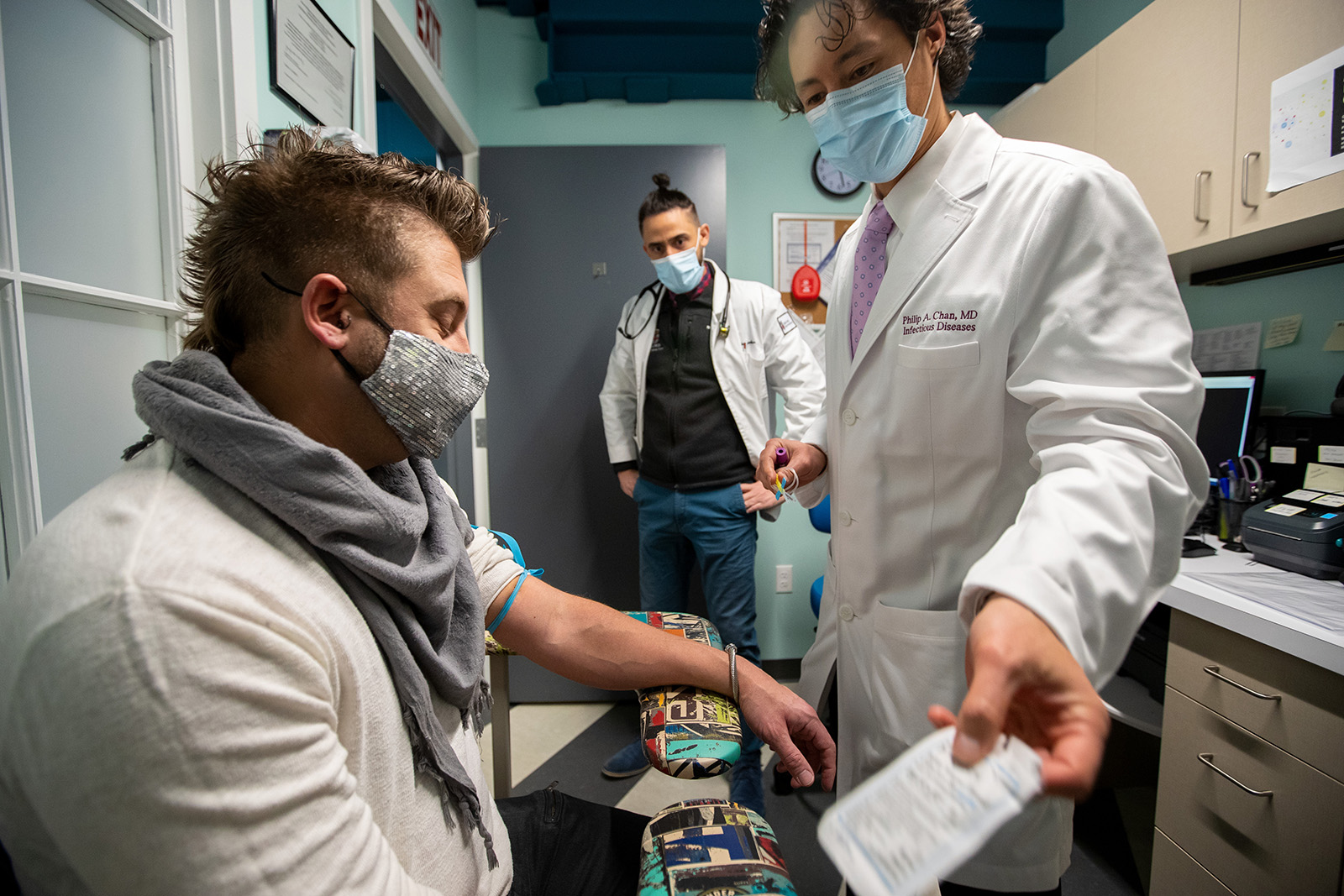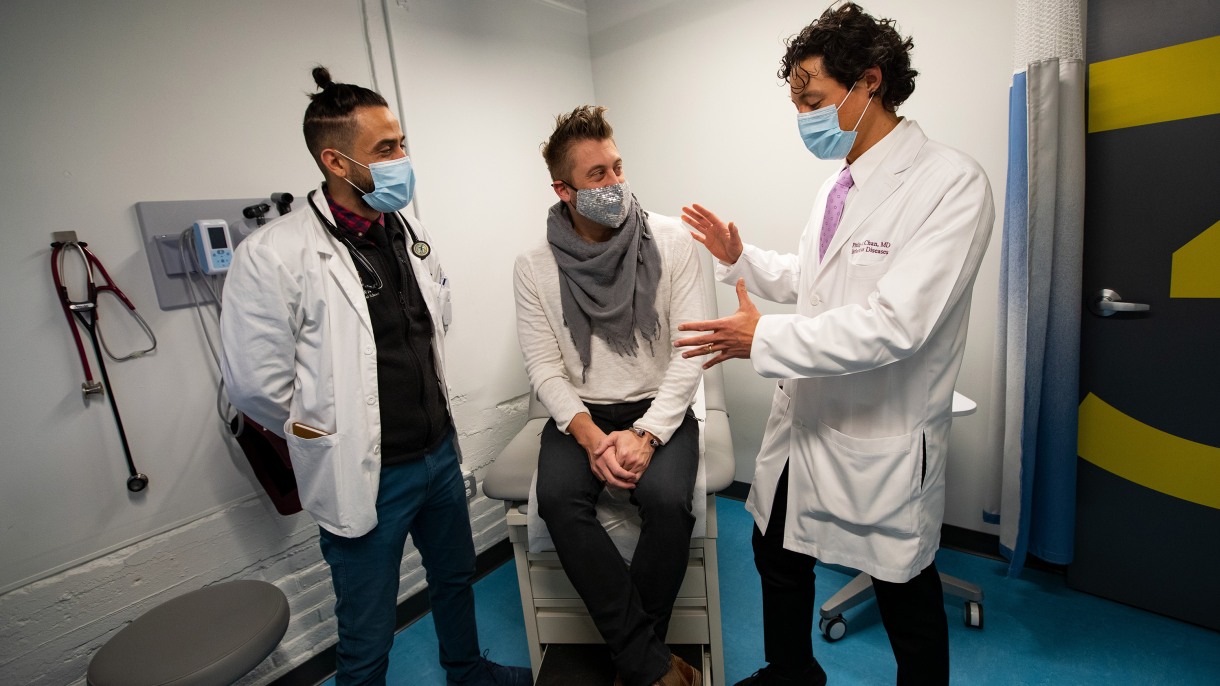At the Providence Community Health Clinic, improving access and care for LGBTQ+ patients
JD Crooks, a patient, said he first heard about Open Door Health from his friend Richie DeFilippo, a local LGBTQ+ community activist whose face appears on the mural that adorns the exterior wall of the clinic. Crooks began visiting regularly for COVID-related services, but has since expanded his involvement by serving on the clinic’s Community Advisory Board.
“If you need anything – anything – they’re here for you,” Crooks said.
As he saw more community members struggling with pandemic-related job loss, Crooks began referring people without a primary care doctor or health insurance to Open Door Health, noting that the clinic “finds a way to make it work”.
“We need the clinic to be sustainable, but we’re not focused on the money,” Chan said. “If someone owes us $20, we’re not going to turn them away. We will do what we can to help them. »
It’s a sentiment rooted in Nunn, whose research background is in global health. Resources – including doctors – are often limited in these settings, so much is led by nurses or community health workers. The model not only empowers nonphysician healthcare workers to do more, Nunn said, but it creates an informed and prepared community that is able to deliver care more effectively. For example, a nurse-led STI screening process at Open Door Health adopts standing orders – written protocols that authorize certain health care providers, such as nurses and physician assistants, to perform certain clinical tasks without having to first obtain a medical prescription.
Using this model, the clinic has been able to keep costs low and significantly scale up STI testing – a critical need, as the positivity rate for STI services at Open Door Health is 25%. five times the national average.
Clinical Nurse Manager Leigh Hubbard oversees the STI testing program and said that in the nine months of offering walk-in testing services, they tested, treated and educated over 1,000 people, preventing community spread of infections.
During a testing encounter, Hubbard said he spoke with a patient at high risk for HIV about taking PrEP. He was hesitant because he was uninsured and PrEP can cost $1,000 a month. Hubbard worked with a patient advocacy program to cover his drug costs and provided him with information about the health insurance exchange; when the patient returned for a follow-up appointment, he had secured coverage and had his first medical exam in five years. Since then, he has continued to return to the clinic for vaccinations, screenings and continued PrEP therapy.
“That’s what’s possible when you open doors for people, when you’re real with them, educate them, and help them overcome their fears and all the barriers that keep them from getting care,” said Hubbard. “And it all started with an STI test.”
From how to implement large-scale health promotion programs to how to most effectively reduce infection rates among vulnerable populations, Nunn and Chan have spent decades studying issues of in their research and have, in turn, applied the lessons learned from their studies to real clinical studies. practice. It is a perfect illustration of the impact that research can have on the health of communities.
“What we do at Open Door Health is public health in action. This is politics in action. It’s our research that’s delivered,” Chan said, “how it’s meant to be.
A real impact on patients in Rhode Island
Study after study showed that LGBTQ+ people often face barriers to accessing essential health services and, as a result, may have poorer health outcomes. Stigma, judgment and discrimination impact the quality of care an LGBTQ+ patient receives, i.e. whether they are not outright denied care because of their sexual orientation or gender. gender identity.
Unfortunately, this is something Crooks has witnessed many times.
“I’ve had friends whose doctors wouldn’t prescribe PrEP for them,” Crooks said, “because they didn’t know about it or they didn’t agree with it. And it’s not up to a doctor to decide not to take PrEP because they don’t agree with your lifestyle. Open Door Health is not like that at all.

To address some of the health issues that can arise from improper treatment – such as mental health issues or substance abuse – the Open Door Health team will never pass judgment or refuse treatment to a patient for having made decisions that he deems appropriate for his own body. , said Mary Beth Dromgoole, nurse practitioner at the clinic specializing in gender-affirming care.
Recognizing that gender affirmation care can look different for everyone, the clinic provides services ranging from medical affirmation with hormones and referrals to surgical services to social support and getting new legal documents reviewed. such as birth certificates and driver’s licenses.
“There is such vulnerability involved in these visits,” Dromgoole said. “Patients often reveal thoughts, feelings, or truths that they have never spoken out loud before.”
Approaching these visits with warmth, knowledge and intentionality creates a clinical environment that aims to be truly inclusive — something the LGBTQ+ community in Rhode Island has been sorely lacking, patients and providers say. While Dromgoole expected to hear from members of the community expressing this need, she said she was surprised to find that “all patients – even some of our patients with enormous socio-economic privilege – describe the feeling of to be “heard” or “seen” for the first time.”
For Crooks, that’s exactly why it’s so crucial that options like Open Door Health exist in every community. Without that visibility and representation, he said, it’s hard to know where to go or what to do when health issues arise.
“It’s much more inclusive now, but growing up, I never saw doctors talking to their patients about gender-affirming care or same-sex sexual encounters or PrEP,” he said. declared. “There can be an element of guilt or shame, or a feeling of being wrong because you don’t see yourself represented. But you are not. You still deserve care.


Comments are closed.